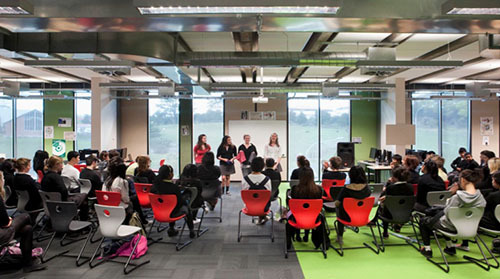
Nouvelle-Zélande est l'un des systèmes scolaires les plus décentralisées dans le monde occidental. Si, par exemple, une école en Nouvelle-Zélande est un échec, le dernier mot sur toutes les choses réside avec la communauté scolaire. Un gérant peut être envoyé à l'école d'échec, mais selon Dr. Rosemary Hipkins, Chercheur en chef du Conseil néo-zélandais pour la recherche en éducation (NZCER), “la brève sera à obtenir l'administration sur les rails (en termes de lignes directrices nationales d'administration de la Nouvelle-Zélande).” Alors que Conseil d'administration de l'école doit aussi faire rapport au ministère de l'Éducation sur la réalisation des objectifs de l'école a développé, Rose note que “le leadership en éducation de l'école, et de répondre aux lignes directrices nationales d'éducation, réside avec le directeur et l'équipe de la haute direction.”
La pensée et le changement dans l'éducation transformatrice commence avec un engagement passionné pour fournir aux jeunes les outils dont ils auront besoin pour réussir dans un monde du 21e siècle. Quels types de compétences et attributs si un Néo-Zélandais ont instruits? Rose Hipkins et son équipe de recherche, includingyour Rachel Bolstad, Sally Sue Boyd et McDowell, ont donné un aperçu de leur nouveau livre intitulé, Compétences clés pour l'avenir. Comme beaucoup d'autres nations, Nouvelle-Zélande a développé son propre ensemble de compétences clés, adapté à partir des originaux de l'OCDE. Les auteurs ont voulu aller plus loin, et ainsi appliquer plus d'une décennie de recherches et de connaissances pour créer un livre qui permet aux éducateurs de comprendre les compétences au sein de la Nouvelle-Zélande Curriculum plus profondément afin d'inspirer plus d'innovation dans leur pratique. Je ai invité les auteurs à partager leurs points de vue avec nous La recherche globale pour l'éducation.

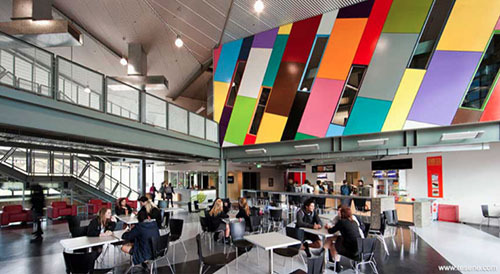
What were the key competencies you defined for a 21st century education in this book?
Rose: We see the important question as being about what we want our young people to be capable of doing and being as a result of their learning. A late 20th century UNESCO project that addressed this question identified four “pillars of learning” for the 21st century: learning to know; learning to do; learning to live together; and learning to be. The OECD subsequently redeveloped the general thrust of the four pillars as a set of key competencies. Comme beaucoup d'autres nations, New Zealand then developed its own set of key competencies, adapté à partir des originaux de l'OCDE. We wanted to go further – to look beyond the assumption that naming a set of competencies in a national curriculum will be enough to trigger changes in practice. So we worked backwards from the analysis of some well known wicked problems (mondialisation, la sécurité alimentaire, changement climatique, justice sociale, change in education itself) to arrive at a hopeful set of aspirations for who we want our young people to be. Par exemple, we want our young people to: savent qui ils sont, ce qu'ils apprécient et pourquoi, et où ils se situent dans; à la question les prétentions au savoir, plutôt que de les prendre à leur valeur nominale; and to look beyond immediate causes to consider the joined-up nature of things and events in the world.

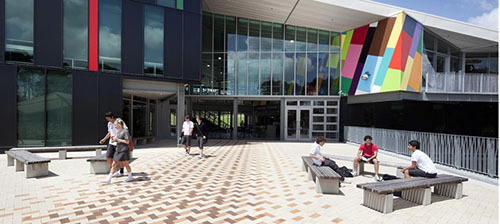
Why does education require transformative change now? Why is this change difficult?
Rachel: It’s easy to get swept up in the zeal for educational changement, but first we need to achieve transformative educational thinking. Oui, some things de need to change, but at the same time there are also many fantastic ideas and practices that we need to hold on to and even amplify across the system. “Transformation” is as much about all of us being willing to change ourselves as it is about changing the system. We need to get better at knowing what’s important and what’s not. We need to get comfortable asking questions about how education connects to the kind of future(s) we want for ourselves and our societies. Facing those questions without feeling overwhelmed or losing our way is probably the hardest part of all of this. Creating change itself isn’t always as difficult as it may seem. En fait, we’ve observed that when people do tackle those big important questions it can unleash a lot of passion and creative energy. That’s certainly something we need more of at every level of the education system and in all the places where education touches the rest of our society. Some people think change is exciting and empowering, some people think it is scary and difficult. It’s both. We’ve tried to model a creative and energy-giving approach in the book without shying away from the difficult questions.

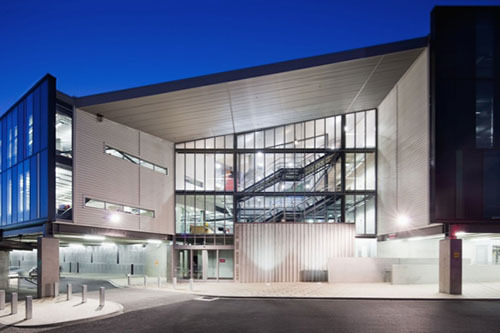
Please share some examples of how “innovative teachers” are making a positive difference in their classroom practice.
Sally: Our book includes many examples of New Zealand schools and teachers who are embracing change. These teachers are thinking deeply about new ways of strengthening students’ competencies so learners can become builders of their and our futures, not just passive recipients of whatever may come. In different ways, these teachers are supporting students to consider and address the challenging dilemmas presented by the wicked problems we chose to work with.
Par exemple, one senior secondary college (catering for 15 à 18 ans) structures its learning programme so that one day a week all students commit to designing and carrying out “impact projects”. Each project needs to involve substantial learning beyond the classroom, produce a quality product, and enable students to make a difference within their community. Dans le livre, we focus on two students who were starting a youth health council to raise the profile of mental health issues at their school.
Another great example involves 8-9 ans. Their teachers guided them through an enviro-ethics exploration to confront both sides of the emotive issue of whether or not to cull wild horses in an area of unique indigenous flora and fauna. Using an arts-based approach known as “mantle of the expert”, tensions between different courses of action were explored. Through drama activities, students experienced the very different perspectives of ecologists and protest groups opposed to the cull. They then developed storyboards for a documentary on the different sides to the issue, to be made by a fictional company. It’s worth listening to two of the teachers talking about this experience. They urge other teachers to “just have a go”, and it’s obvious that they found the learning experiences just as empowering and exciting as their students did.
Our third example outlines a deep set of relationships that developed between a school, the indigenous Maori community, other local groups, and the science community. Learners and teachers joined these other groups to explore connections between science and local knowledge relevant for preserving and sustaining the local environment in a very special area of New Zealand, Uawanui or Tolaga Bay.
What do you want educators to take away after reading the book?
Sue: We would like educators to finish our book thinking more deeply about what education is for, et de penser à des moyens plus sophistiqués sur les compétences clés et les sortes de gens, nous voulons que les étudiants soient.
Pour d'autres articles sur la Nouvelle-Zélande: Nouvelle-Zélande est prête!
Pour d'autres articles sur: Réforme de l'éducation mondiale
Pour plus d'informations sur Sally Boyd
Pour plus d'informations sur Rachel Bolstad
Pour plus d'informations sur Rose Hipkins
Pour plus d'informations sur Sue McDowell


Les photos sont une gracieuseté de Albany Senior High, Nouvelle-Zélande
Pour plus d'informations: http://www.nzcer.org.nz/nzcerpress/key-competencies-future
Rejoignez-moi et leaders d'opinion de renommée mondiale dont Sir Michael Barber (Royaume-Uni), Dr. Michael Bloquer (États-Unis), Dr. Leon Botstein (États-Unis), Professeur Clay Christensen (États-Unis), Dr. Linda Darling-Hammond (États-Unis), Dr. MadhavChavan (Inde), Le professeur Michael Fullan (Canada), Professeur Howard Gardner (États-Unis), Professeur Andy Hargreaves (États-Unis), Professeur Yvonne Hellman (Pays-Bas), Professeur Kristin Helstad (Norvège), Jean Hendrickson (États-Unis), Professeur Rose Hipkins (Nouvelle-Zélande), Professeur Cornelia Hoogland (Canada), Honorable Jeff Johnson (Canada), Mme. Chantal Kaufmann (Belgique), Dr. EijaKauppinen (Finlande), Le secrétaire d'Etat TapioKosunen (Finlande), Professor Dominique Lafontaine (Belgique), Professeur Hugh Lauder (Royaume-Uni), Professeur Ben Levin (Canada), Seigneur Ken Macdonald (Royaume-Uni), Professeur Barry McGaw (Australie), Shiv Nadar (Inde), Professeur R. Natarajan (Inde), Dr. PAK NG (Singapour), Dr. Denise Pape (États-Unis), Sridhar Rajagopalan (Inde), Dr. Diane Ravitch (États-Unis), Richard Wilson Riley (États-Unis), Sir Ken Robinson (Royaume-Uni), Professeur PasiSahlberg (Finlande), Professeur Manabu Sato (Japon), Andreas Schleicher (PISA, OCDE), Dr. Anthony Seldon (Royaume-Uni), Dr. David Shaffer (États-Unis), Dr. Kirsten immersive, (Norvège), Chancelier Stephen Spahn (États-Unis), Yves Thézé (LyceeFrancais États-Unis), Professeur Charles Ungerleider (Canada), Professeur Tony Wagner (États-Unis), Sir David Watson (Royaume-Uni), Professeur Dylan Wiliam (Royaume-Uni), Dr. Mark Wormald (Royaume-Uni), Professeur Theo Wubbels (Pays-Bas), Professeur Michael Young (Royaume-Uni), et le professeur Zhang Minxuan (Chine) alors qu'ils explorent les grandes questions d'éducation de l'image que toutes les nations doivent faire face aujourd'hui. La recherche globale pour l'éducation communautaire page
C. M. Rubin est l'auteur de deux séries en ligne largement lecture pour lequel elle a reçu une 2011 Upton Sinclair prix, “La recherche globale pour l'éducation” et “Comment allons-nous savoir?” Elle est également l'auteur de trois livres à succès, Y compris The Real Alice au pays des merveilles, est l'éditeur de CMRubinWorld, et est une fondation perturbateurs Fellow.


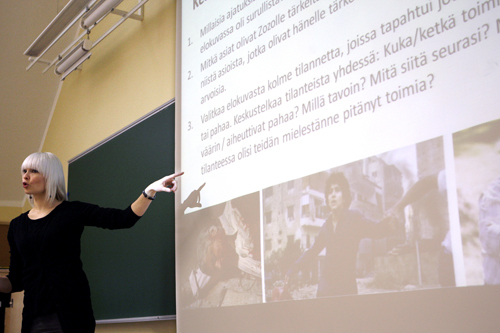
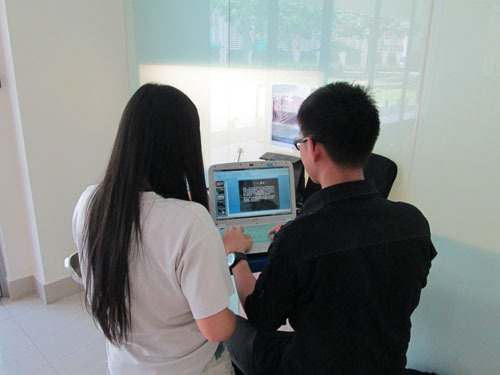
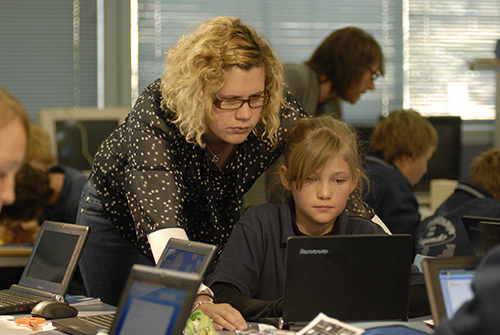
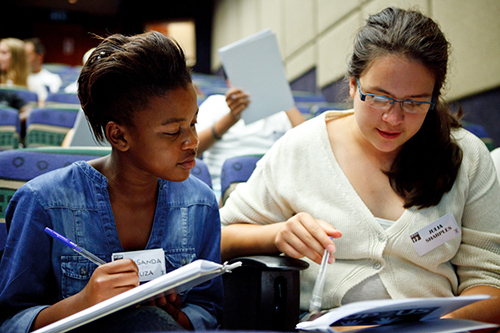
Commentaires récents